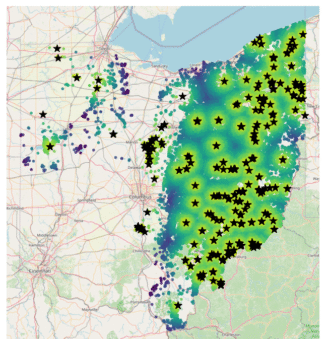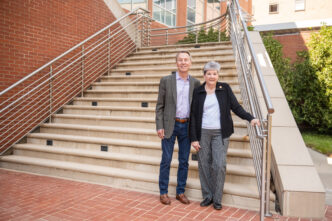Four Clemson University researchers are working with Prisma Health physicians and staff to help create solutions to COVID-19 pandemic questions. These questions include how to monitor patients from home after discharge, how to efficiently sanitize N95 masks for reuse, how to best develop antiviral therapeutics and how to best develop quick diagnostic tests.
These researchers from the College of Engineering, Computing and Applied Sciences and the College of Science have been awarded funding through the Innovation Maturation Fund, a joint effort of the Clemson University Division of Research and the Health Sciences Center (HSC) at Prisma Health. The Joint Innovation Maturation Fund program is designed to serve as a funding and collaboration catalyst to increase applied research collaborations between Clemson University health research faculty and Prisma Health clinicians. The goal is to promote ideation and design of medical technology innovations that are high-potential follow-on sponsored research and commercialization opportunities, said Chris Gesswein, Executive Director of the Clemson University Research Foundation.
“By combining the scientific expertise and engineering core competencies of the Clemson University research enterprise with the translational and clinical core competencies of Prisma Health clinicians, this program provides a ‘concept-to-product’ construct to advance these promising COVID-19 innovations toward tangible products/services that will benefit South Carolina and beyond, via improved health outcomes,” Gesswein said. “Congratulations to the recipients for their continued dedication to improving health care and for the innovative contributions they continue to make in the midst of this challenging pandemic.”
The following projects were awarded:
Rapid Point of Care COVID-19 Diagnostics

Terri Bruce, academic program director and research assistant professor in the Clemson Department of Bioengineering, will work with her research team to develop a novel point of care test that can easily detect the COVID-19 virus with unprecedented levels of sensitivity. Her team consists of Kenneth Marcus, a professor in the Department of Chemistry, David Bruce, a professor and Chair of the Department of Chemistry and Biomolecular Engineering, Richard Hodinka, professor of microbiology at the University of South Carolina School of Medicine, Mark Call, MD, Vice Chair of Quality and Safety in the Department of Medicine at the UMG Division of Infectious Diseases, and J. William Kelly, MD, a physician in the Prisma Health–University Medical Group Division of Infectious Diseases. The team’s goal is to make this test easily accessible for clinics that do not have equipment to process COVID-19 nasal swabs or even be done at home.
N95 Mask Cleaning System: Validation and Clinical Translation

Melinda Harman, an associate professor in the Clemson Department of Bioengineering, and Jim Kilton, the Manager of Performance Improvement at Prisma Health, will work to develop an efficient mask cleaning system that will enhance N95 respirator mask reprocessing. This new system will consist of a rack to hold bundles of N95 respirator masks during reprocessing and prevent mask deformation, as well as a cleaning process for removing soils without disrupting the filtering membrane, and a drying mechanism for removing rinsing fluids through heated air. The goal is to help hospitals combat low mask supplies and to act as an alternative to the current reprocessing system that takes time and manpower.
Antiviral Susceptibility Screening of Topoisomerase Inhibitors

Dev P. Arya, a professor in the Clemson Department of Chemistry, and J. William Kelly, MD, a physician in the Prisma Health–University Medical Group Division of Infectious Diseases, will work to further develop a small library of compounds identified as topoisomerase inhibitors that can be expanded to aid in Coronavirus specific antiviral screening, with the potential to be broad spectrum therapeutics. They will work alongside Richard Hodinka, a professor of microbiology at the University of South Carolina School of Medicine, and Mark Call, MD, Vice Chair of Quality and Safety in the Department of Medicine at the UMG Division of Infectious Diseases.
mHealth Virtual Agent System for Remote Monitoring of Respiratory Distress and Hypoxia Mitigation in COVID-19 Patients

Sabarish Babu, an associate professor in the Clemson School of Computing, along with Jennica Siddle, an Emergency Department physician at Prisma Health, are continuing their work on a patient-centered self-management tool to support patients’ self-care at home. This device can be used to provide real-time monitoring of COVID-19 patients recovering at home. Their goal is to provide constant monitoring of the patients, so they do develop respiratory distress and hypoxia while recovering at home after being discharged from the hospital.







